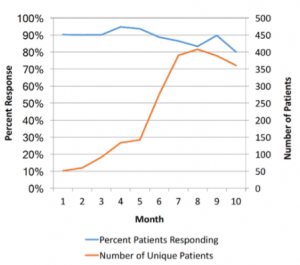Study: A novel patient engagement platform using accessible text messages and calls (Epharmix), maintains high patient engagement, collects and alerts providers to actionable health data
September 21, 2017 at 11:12 AM
Health care providers managing patients with chronic disease recognize the need for long-term patient engagement strategies to improve compliance with therapy and treatments in between doctor visits. Past attempts using portals and apps have faced challenges including a lack of internet access and ease of use, especially among low-income patients. Given that 97% of patients carry a cell phone with voice and SMS texting, researchers studied the ability of an automated SMS and phone-based platform to collect and alert providers to patient-generated data and maintain patient satisfaction.
In a new study published in JMIR - Formative Research, researchers found that Epharmix’s SMS and phone-based platform maintained at least an 80% weekly engagement rate for nine consecutive months while conducting proactive patient outreach to collect health data and detect relevant clinical alerts across a variety of disease states including diabetes, hypertension, and COPD in an underserved population of the City of St. Louis.
In total, 28,386 text messages and 24,017 calls were sent to 929 patients over nine months allowing the system to detect 1,164 clinically significant events including diabetic hypoglycemia and hyperglycemia, COPD exacerbations, heart failure decompensations, hypertensive crises, wound infections, and breastfeeding complications. Once caught by the Epharmix automated system, proactive care was able to be provided as deemed appropriate by the patient’s specific provider. “Accomplishing this degree of proactive care through an alternative method, such as a provider-initiated phone bank, would be cost prohibitive and most likely associated with lower patient engagement,” the researchers said.
With any patient engagement strategy, it is crucial to be mindful of the patient response burden. Patients in the study reported increased satisfaction and communication with their provider. Additionally, the majority of patients felt the frequency of messages was nearly perfect, even as the absolute number of touchpoints increased. Epharmix increased the number of patient-provider interactions to over 10 on average in any given month for patients across multiple disease states.
Researchers conclude, “We demonstrated that engagement among high-risk populations is possible when health care comes conveniently to where they are. Additionally, Epharmix messages are already being used for the early detection and intervention of clinically significant events such as chronic obstructive pulmonary disease (COPD) exacerbations, heart failure decompensation, and hypoglycemia.” In recently published follow-up studies the system demonstrates a significant reduction in HgbA1c and blood pressure.
To learn more:
Try our Demo or contact jason (@) epharmix.com



